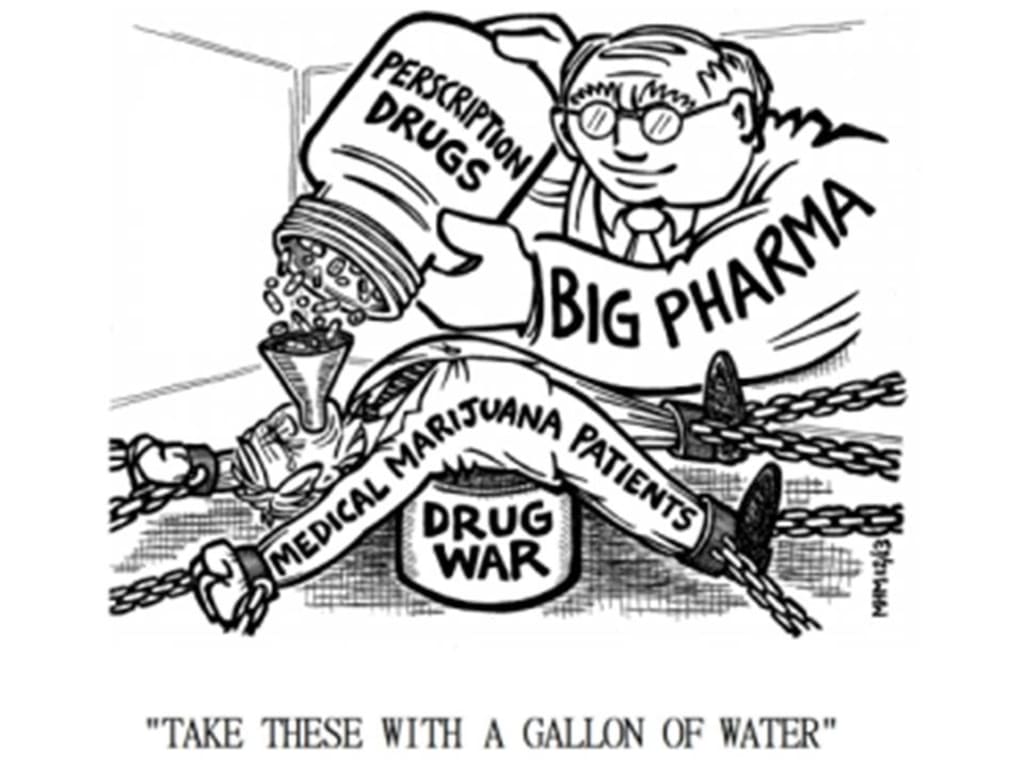Beyond the Agenda
Why Marijuana Isn't Legal Yet

Once considered a “gateway drug”, the truth about marijuana is clearly starting to overcome the stigmatism that has long been associated with its use. The truth is that marijuana is 100 times safer than many medications with severe side effects that are prescribed in its place every day. It has several medical benefits which could hinder the profitability of one of America’s biggest money making industries: pharmaceuticals. As found in a study conducted by W. David Bradford and his daughter, Ashley Bradford, researchers at the University of Georgia (washingtonpost), there is concrete evidence found in the significant decrease in numbers of pharmaceuticals being prescribed to Medicare D patients in states which have legalized the use of medical marijuana (healthaffairs). Suggestively, elderly patients who receive Medicare are the least likely to engage in medical marijuana activities. So, it can then be concluded that on a larger scale if the population of young adults who are more open to treatment with cannabis were considered, the number of prescriptions would drop even more. Therefore, if/when marijuana becomes legal country wide, the effect it could have on the pharmaceutical industry overall would weigh in around $4 billion per year. On the other hand, as seen in Colorado throughout 2016, marijuana sales could bring in over $1 billion per state, totaling in excess of an estimated $50 billion annually from the new market. That means that the country would see a loss of $4 billion from a harmful business in exchange for a $50 billion profit from a safer alternative. It seems like common sense. Unfortunately, it’s not so simple.
In November of 2016, there were nine states that were voting on the legalization of marijuana. Voters in Arkansas, California, Florida, Maine, Massachusetts, Montana, Nevada, and North Dakota all decided in favor of the ballots. The voters in lonesome, singled out Arizona did not vote in favor for the ballot by a very close split of 51%-49%. However, it is important to note that Insys Therapeutics, which is best known for its fentanyl based spray, contributed half a million dollars to the anti-legalization campaign in Arizona at the time, Prop 205, also becoming one of the largest individual contributions to any anti-legalization campaign in American history. By tipping the political scales, Insys was then also able to create its own synthetic THC pharmaceutical product, Syndros, and have it classified by the DEA as a Schedule II controlled substance, while natural organic cannabis remains a Schedule I.
At the same time all of this has been taking place, half of a dozen former Insys Therapeutics executives are facing separate criminal and civil charges on accusations such as racketeering, bribery, and wrongful death as they are believed to have coerced and/or persuaded doctors into overly or wrongfully prescribing the company’s fentanyl spray. Subsequently, opioid addiction has sky rocketed. It is of no wonder that opioid related deaths, especially those specifically related to fentanyl, have thus significantly increased all across the country and have even begun to pose a danger to health care employees, law enforcement personnel and emergency first responders who simply come into contact with the fatally potent substance.
It is estimated that over 65,000 deaths last year were directly related to drug overdoses. According to the National Institute on Drug Abuse, the number of deaths from heroin and non-methadone synthetics, including fentanyl, has increased by an astonishing 600% over the last 15 years. To compare, it is estimated that around 88,000 people die annually from preventable causes related to alcohol. Do you know what the number of marijuana overdoses is? ZERO! Not one single recorded death due to a marijuana overdose even exists; it is perhaps safe to say that it isn’t humanly possible to overdose on marijuana.
Again, as seen in Colorado, $300 million from marijuana revenue is going back into the community and into the schools as they repair and rebuild their crumbling public infrastructures. They have also used marijuana funds to repair roads and support public services to help the homeless and create substance abuse programs.
The fiction we have been fed about marijuana has only served the purpose of lining the pockets of select few elites. It has criminalized many sick and innocent people and has wasted billions of tax dollars while doing so. The facts cannot be misinterpreted and the numbers speak for themselves. It is only a matter of time before the medicinal market of America experiences a revolution with marijuana. Pharmaceuticals and health insurers are most certainly in for a rude awakening.
Show your support for medical marijuana with this marijuana strong arm T-Shirt. $15 with free shipping!
About the Creator
Amanda Spradlin
Amanda Spradlin is the founder of Coincidental Chaos. She writes with the passion of a questionable mind. Any donations are appreciated!






Comments
There are no comments for this story
Be the first to respond and start the conversation.